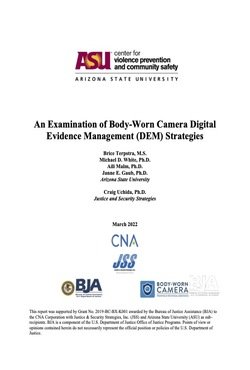By Brice Terpstra; Michael D. White; Aili Malm; Janne E. Gaub; Craig Uchida
This examination of the management of digital evidence captured by body-worn cameras (BWCs) pertains to “the process by which an agency manages, stores, and transmits the data generated by BWCs and other devices (e.g., other types of cameras, cell phones).” An earlier study of seven jurisdictions (Uchida et al., 2021) examined the way in which BWC footage flowed through policing agencies and in the criminal justice system. The report provided an understanding of the key challenges and issues faced by law enforcement agencies and prosecutor offices as they use BWCs routinely. To further our knowledge, we conducted an online survey of agencies receiving federal funds for BWC through the Bureau of Justice Assistance Policy and Implementation (PIP) BWC funding program to address this gap. We asked agencies approximately 30 questions related to digital evidence management (DEM), including basic program management, internal uses of footage, external sharing, challenges, and future developments. Sixty-eight agencies completed our survey, and this report details those results. The most common challenges identified were cost/staffing/resources (28 percent); storage/infrastructure requirements (25 percent); and video redaction (14 percent). Agencies also cited Freedom of Information Act public requests for BWC evidence footage. Perceptions of future developments were also discussed.
CNA Corporation with Justice & Security Strategies, Inc. (JSS) and Arizona State University (ASU): 2022. 17p.




